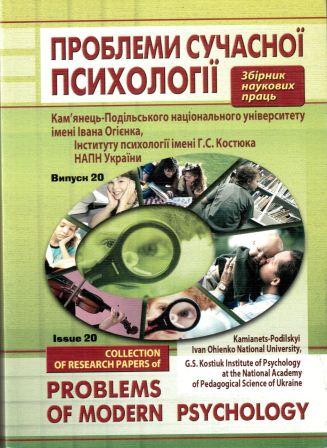Особистісна культура вчителя як чинник розвитку креативності підлітка
DOI:
https://doi.org/10.32626/2227-6246.2013-20.%25pKeywords:
конвергентне мислення, дивергентне мислення, креативність, творча діяльність.Abstract
У статті проаналізовано особистісну культуру вчителя в професій-
ній діяльності педагогів; охарактеризовано основні чинники розвитку
креативності підлітка; обґрунтовано розвиток творчої діяльності вчи-
теля у психологічній науці. Встановлено, що лише через спілкування
можлива передача знань і засвоєння професійних знань, формування
професійних вмінь і навичок, розвиток професійного світосприйняття
майбутнім спеціалістом у ході навчально-виховного процесу.
References
Богоявленская Д.Б. Интеллектуальная активность как про-
блема творчества / Д.Б. Богоявленская. – Ростов-на-Дону:
Изд-во Рост-го ун-та, 1983.
Кукуленко-Лук’янець І.В. Особистісно-креативний підхід у
навчанні іноземної мови / І.В. Кукуленко-Лук’янець. – Чер-
каси, 2004.
Мамчур І.А. Формування комунікативного потенціалу май-
бутнього вчителя іноземної мови засобами культурологічно
орієнтованого навчання: автореф. дис. на здобуття наук. сту-
пеня канд. психол. наук: спец. 19.00.07 „Педагогічна та віко-
ва психологія» / Інна Анатоліївна Мамчур. – К., 2007. – 20 с.
Моляко В. А. Интеллектуальная одарённость и ёё выявление у
детей старшего дошкольного возраста / В. А. Моляко. – К., 1993.
Психология одаренности детей и подростков / Под ред.
Н.С.Лейтеса. – М.: Академия, 1996.
Роджерс К. Консультирование и психотерапия / К.Роджерс. –
М.: Изд-во ЭКСМО-Пресс, 2000.
Gilford J. The nature of human intelligence / J. Gilford. – New
York: McGraw-teil, 1967.
Downloads
How to Cite
Issue
Section
License
Copyright
The Editorial Board has the full right to publish original scientific papers containing results of theoretical and experimental research works which are not currently subject to review for publication in other scientific editions. The Author shall transfer to the editorial board of the Collection the right to spread the electronic version of the paper, as well as the electronic version of the paper translated into English (for papers originally submitted in Ukrainian and Russian) by all kinds of electronic means (placement at the official website of the Collection, electronic databases, repositories etc).
The Author of an article reserves the right to use materials of the paper, without approval with the editorial board and the founders of this Collection: a) partially or fully, for educational purposes; b) for writing own dissertation papers; c) for preparation of abstracts, conference reports and presentations.
The Author of an article can place electronic copies of the paper (including the final electronic version downloaded from the official website of the Collection) at:
- personal web resources of all Authors (websites, webpages, blogs etc.);
- web resources of the institutions where the Authors are employed (including electronic institutional repositories);
- non-profit public access web resources (for example, arXiv.org).
But in all cases, it is obligatory to have a bibliographic reference to the paper, or a hyperlink to its electronic copy placed at the official website of this Collection.






